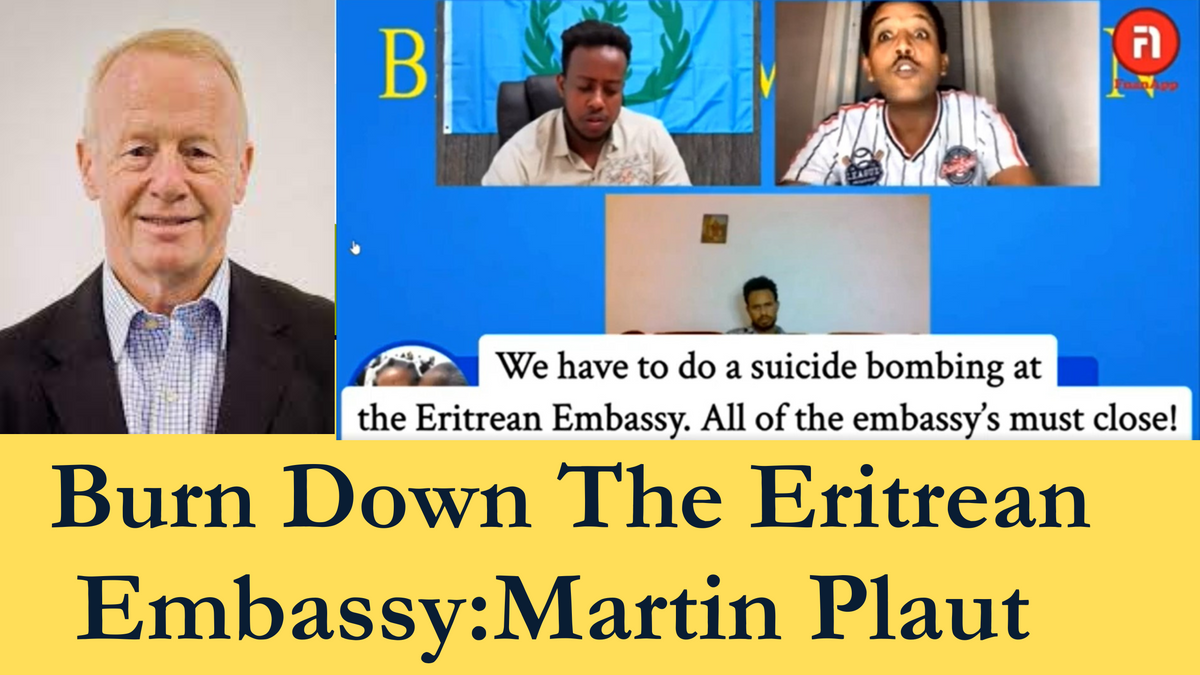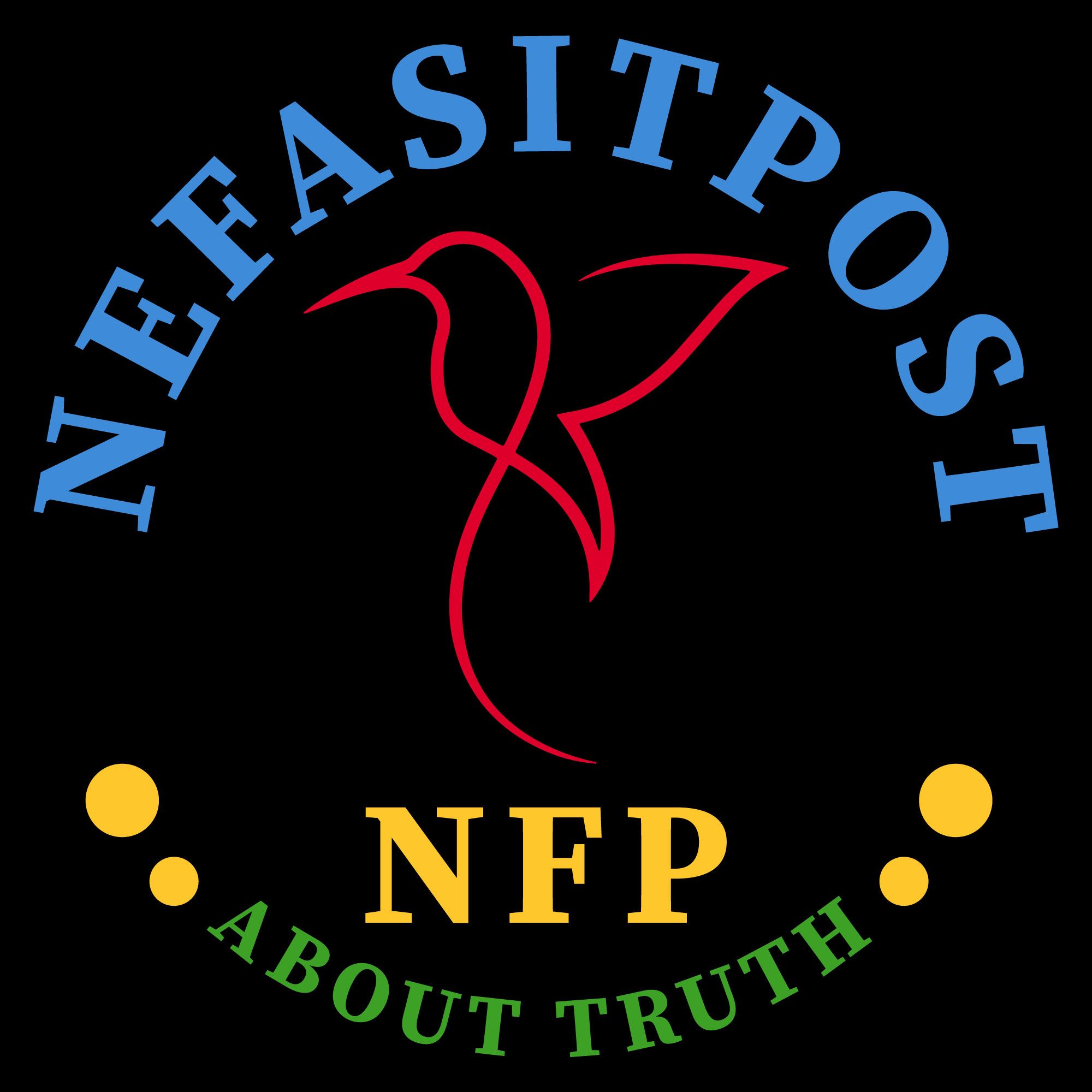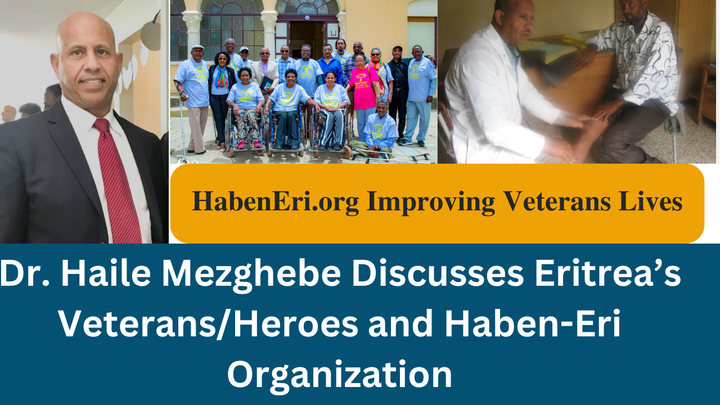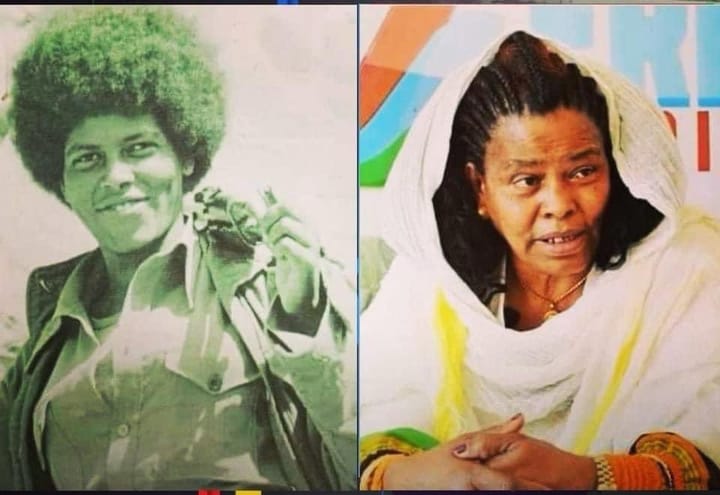Holding Martin Plaut Accountable: Eritreans Must Take Legal Actions Against Incitement to Violence and Terrorism
Eritreans in the UK unite to seek legal action against Martin Plaut for inciting violence and hatred. Time for accountability! #MartinPlaut #Eritrea #LegalAction

Amanuel Biedeamriam
September 21, 2023,
The people of Eritrea, the Eritrean community in the UK, and the Embassy of Eritrea need to hold the South African Apartheid Era relic Martin Plaut legally accountable and ensure that he pays for the criminal terrorist activities he has been inciting for over two decades.
The Eritrean Community, the Eritrean Embassy, and the individuals victimized in the London attacks should launch significant legal actions against Martin Plaut. Every Eritrean who endured harm should explore all available legal channels for seeking redress. This course of action is prompted by Martin Plaut's remarks during a London conference where he provided guidance to his followers on how to garner media attention. Martin Plaut said,
“Do Not demonstrate in front of the Eritrean Embassy unless you will burn it down.”
Martin Plaut has persistently advocated for violent actions targeting Eritreans in Western capitals and Israel, displaying unwavering commitment to inciting hostility against peaceful Eritrean communities in the West. The recent surge in violence against Eritreans in Europe, Israel, Canada, and the United States can be directly linked to the instigation, motivation, and campaigns orchestrated by Martin Plaut and ilk such as Mirjam van Reisen.
Eritreans have made continuous efforts, including writing and appeals, to combat the hate-mongering directed at Eritrean communities in the West and Israel. This is especially vital because law-abiding Eritreans who express support for their nation often face unjust labeling as pro-Eritrean government individuals, subjected to vilification as if they are not entitled to support the government.
Eritreans have actively engaged in writing appeals and taking various measures to combat the propagation of hatred against Eritrean communities in the West, particularly those labeled as supportive of the Eritrean government. These individuals have been unfairly vilified, often stripped of their right to support their government freely.
Furthermore, they have scrutinized Martin Plaut and criticized him for disseminating false information and fabrications about Eritrea and its people. A notable instance occurred on June 26, 2016, when Martin Plaut, a contributor to The Guardian, posted a tweet stating, "A vast number of Eritreans demonstrate against the regime and in support of the UN Commission of Inquiry in Geneva." However, the image accompanying this tweet was from a 2014 Albanian Eid al Adha prayer event, not a demonstration in Geneva as claimed.
Eritreans promptly pointed out this discrepancy to him via Twitter. In response, Martin Plaut blocked these individuals and ultimately deleted his misleading tweet. This incident was not an isolated case but rather part of a pattern of behavior where Plaut has shared misleading information.

Another example of this disregard for factual accuracy occurred during the sixty-seventh General Assembly in 2013. This assembly involved member states voting on whether Palestine should receive non-member Observer State status at the UN. Shockingly, Martin Plaut tweeted that Eritrea had voted against Palestine even before the voting had occurred. This premature and inaccurate statement once again highlights the need for accountability and adherence to journalistic standards. These instances of making baseless statements without proper verification raise significant concerns about the integrity and credibility of journalism.
Martin Plaut, a controversial figure who has garnered attention in the field of journalism, has consistently placed Eritrea, a sovereign nation, at the center of his writings and campaigns. However, Martin Plaut's background diverges significantly from the norm; some have characterized him as a "Western agent of death," and have faced accusations of conducting an unrelenting campaign against Eritrea's hard-fought independence. Over the years, both Eritreans and Ethiopians have associated him with being an operative for the US and UK foreign services.
For nearly two decades, Plaut has maintained a persistent focus on Eritrea, shaping a narrative aimed at facilitating a regime change in Eritrea. His articles are regularly featured in mainstream media publications, and he is often touted as an authority in these domains. Notably, some reports by prominent organizations like Human Rights Watch and Amnesty International on Eritrea and Ethiopia draw from his writings as source material.
Plaut's sphere of influence and activities extend well beyond the realm of responsible journalism and the consistent production of content aimed at shaping the narratives surrounding Eritrea. His involvement encompasses actions such as orchestrating petition drives with the goal of preventing Eritrean officials from addressing international bodies. He also mobilizes groups purporting to be Eritrean, directing them to carry out anti-Eritrean activities.
Martin Plaut seems to have taken it upon himself to transcend the boundaries typically associated with journalism, effectively becoming an activist against Eritreans in the Diaspora. His actions and guidance have yielded tangible results as his followers heed his directives. He has succeeded in altering the discourse, normalizing expressions of burning Eritrean embassies, and engaging in violent actions against Eritreans during their routine activities and celebrations. Plaut has directly encouraged acts of terrorism and the targeting of innocent Eritreans in the Diaspora. Video: Burn the Embassy Down Decalres TPLF
All of this occurs under the pretext of advocating for regime change in Eritrean, which he alleges violates the rights of Eritreans. Paradoxically, in pursuing this objective, he ends up denying and violating the rights of Eritreans.
However, Plaut appears to overlook a crucial aspect: the very rights he seeks to deny Eritreans in the West are the same rights that protect them from harm. Laws exist to prohibit criminal incitement of terror, hatred, and illicit activities.
Eritreans residing in the West are law-abiding and contribute to their communities by paying taxes. They have been active members of their respective communities for decades, and for nearly half a century, they have been organizing their cultural festivals with proper legal permits from local authorities and governments. These festivals serve as a way for Eritreans to unite, just as they did during the struggle for independence and continue to do after achieving nationhood. It is through these events that Eritreans network, socialize, and maintain connections with one another.
Plaut's criticisms of Eritrean events stem from his assertion that the government organizes them as a covert attempt to create division between the people and the government. In reality, embassies worldwide host cultural events to showcase their heritage and educate individuals about their country's history, politics, culture, music, and more.
The United States, for instance, hosts Fourth of July activities across the globe, along with various cultural events like the Polish Festival, St. Patrick's Day, Cinco de Mayo, and many others, all of which are encouraged by embassies. What sets Eritrea apart? Is it since Eritreans are from Africa, potentially setting a precedent for other European Africans?
Plaut seems to have overlooked that the laws that protect him in the West apply equally to Eritreans. Therefore, Plaut must face legal consequences for criminal incitement and the incitement of terrorism, considering the harm inflicted upon the Eritrean community in London.
According to the law, when someone makes a statement like "Burn the Embassy Down" during a presentation, it must be treated with utmost seriousness and addressed promptly. Ignoring or dismissing such a statement is not an option. This statement represents a direct threat or an incitement to commit violence. Plaut's precise words are unambiguous and were used within the context of encouraging followers who may idolize and blindly follow him. The statement constitutes a credible threat that ultimately materialized.
In the realm of public presentations and speeches, we often hear a wide range of opinions and ideas. However, there are lines that should never be crossed, especially when it comes to advocating violence or harm towards others or institutions. One fundamental aspect to understand is that making threats or incitements to violence is considered a criminal offense in many jurisdictions. The specific charges can vary, encompassing a spectrum of offenses such as terroristic threats, harassment, and incitement to violence.
Plaut's remarks can be categorized as terroristic threats since they create fear and disrupt public peace and safety, aligning with the legal definition of terroristic threats. These laws are unambiguous, particularly when threats involve violence against individuals or institutions, as is the case here.
Furthermore, his statements can also be classified as harassment, as they constitute incitements aimed at Eritreans to instill fear for their safety. Harassment is indeed a criminal offense. Moreover, Plaut's actions can be seen as blatant incitement to violence, which not only encouraged but also incited the anti-Eritrea group known as Bergied Nhamedu to commit acts of violence against Eritreans, constituting a grave offense. Advocating violence or harm towards others or institutions is a clear line that must never be crossed. Incitement to violence is a criminal offense, with charges ranging from terroristic threats to harassment and incitement to violence.
In England, Eritreans constitute a minority group, and some countries have implemented specific hate speech laws to counteract threats rooted in hate or discrimination, providing safeguards for marginalized communities against targeted violence and prejudice.
Beyond potential criminal charges, those making threats or incitements may also be held civilly liable for causing harm to individuals or institutions. Furthermore, most institutions often enforce their own regulations and codes of conduct, with violations possibly leading to disciplinary measures.
In conclusion, although freedom of speech is a treasured right, it should never be misused to endorse harm or violence. A comprehensive understanding of the legal framework for addressing such threats is essential to uphold public safety, ensure justice, and promote a society where open dialogue coexists harmoniously with the well-being of all its members. Achieving a delicate balance between the cherished right to freedom of speech and the imperative of public safety is of utmost importance, given that this freedom, though fundamental, is not absolute. This right does not shield speech that poses an immediate risk to public safety, thus necessitating the legal system to find an equilibrium. In light of the recent attacks in London, it is imperative for the Eritrean Community, the Eritrean Embassy, and the affected individuals to pursue legal action against Martin Plaut collectively, utilizing all available legal avenues for redress.
Don't forget to subscribe and donate if you like what you read




Comments ()